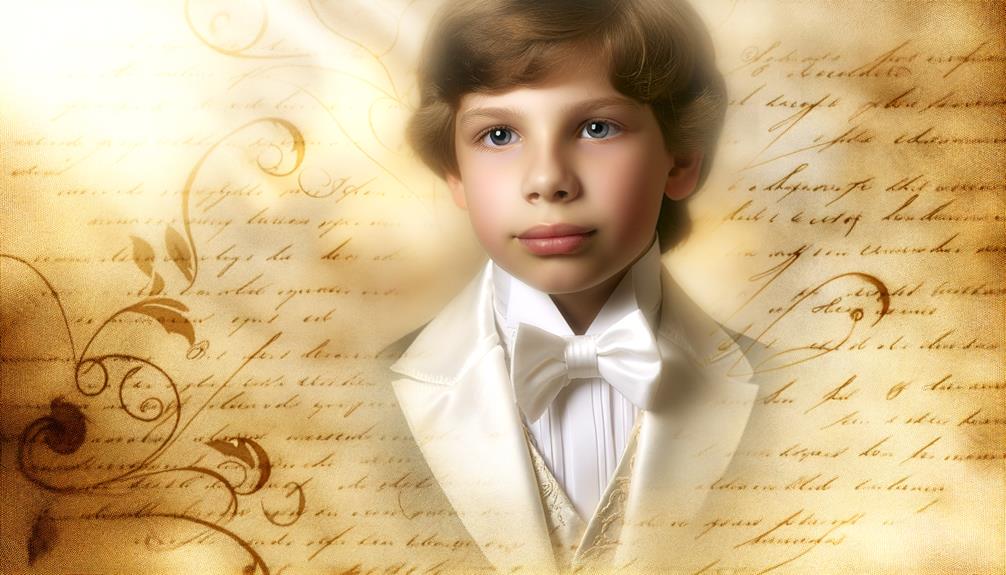Harry Name Meaning in English
The name Harry, a diminutive form of Henry, has rich historical and cultural roots. Originating from the Old French 'Henri' and the Germanic elements 'heim' (home) and 'ric' (ruler), it signifies leadership and authority.
Popular in the Middle Ages, the name is associated with British royalty, including figures like Prince Harry. It features prominently in literature, with characters such as Shakespeare's Prince Hal and J.K.
Rowling's Harry Potter embodying bravery and transformation. Modern figures like Harry Styles continue to shape its cultural significance.
Exploring further will uncover the enduring impact and variations of the name.

Key Takeaways
- Harry is a diminutive form of the name Henry with medieval English origins.
- Derived from Old French 'Henri,' meaning 'home ruler.'
- Historically associated with British monarchy and noble leadership.
- Symbolizes traits like strength, resilience, and authority.
- Popularized in modern culture by figures like Harry Potter and Prince Harry.
Origins of the Name Harry
The name Harry, frequently regarded as a diminutive form of Henry, has its origins deeply rooted in medieval England. Initially derived from the Old French name Henri, which itself originated from the Germanic name Heinrich, Harry emerged as a popular vernacular variant.
The Germanic roots of the name are composed of elements 'heim,' meaning 'home' or 'house,' and 'ric,' meaning 'ruler' or 'power.' Over time, the name Henry evolved through various linguistic transformations, eventually giving rise to Harry.
This evolution reflects the dynamic interplay between language and culture, whereby names adapt and change over centuries. The enduring popularity of Harry underscores its resonance within English-speaking societies, maintaining a connection to its ancient etymological origins.
Historical Context
Understanding the historical context of the name Harry reveals its persistent presence and significance throughout various periods in English history. Emerging from the Old Germanic name 'Heimeric,' meaning 'home ruler,' Harry evolved through medieval England, reflecting societal shifts and linguistic transformations.
Its popularity surged during the Middle Ages, often used as a diminutive of Henry, a name borne by numerous English kings. In literature, the name gained prominence through characters in works by Geoffrey Chaucer and William Shakespeare, reinforcing its cultural resonance.
Additionally, the name Harry was frequently found in historical documents, indicating its widespread use among different social strata. This enduring appeal highlights the name's integration into the fabric of English history and culture across centuries.
Royal Connections
The name Harry has significant royal connotations, particularly within the British monarchy, where it has been borne by various notable figures, including Prince Harry, Duke of Sussex.
Historically, the name has been associated with leadership and nobility, enhancing its prestige. This legacy of famous Harrys underscores the enduring appeal and cultural importance of the name in English history.
British Monarchy Legacy
Often regarded as a name of considerable historical significance, Harry has been associated with numerous members of the British royal family, reflecting its deep-rooted legacy within the monarchy. The name has been borne by several prominent figures, emphasizing its enduring presence across centuries.
Importantly, the name Harry is a diminutive of Henry, a name frequently used among English kings.
- Historical Continuity: The recurring use of the name Harry in the royal family underscores a tradition that connects past and present monarchs.
- Symbolic Relevance: The name embodies the values and responsibilities synonymous with British royalty.
- Cultural Perception: Its royal connections have cemented Harry as a name of prestige and respect within and beyond the United Kingdom.
This legacy enriches its cultural and historical significance.
Famous Harrys Throughout History
Prominent historical figures named Harry have played pivotal roles in shaping the narrative of the British monarchy. Eminently, Prince Harry, Duke of Sussex, has been a significant modern royal, known for his military service and philanthropic efforts.
Another historical Harry, King Henry V, also known as Harry of Monmouth, was instrumental in the Hundred Years' War, achieving a remarkable victory at the Battle of Agincourt.
Additionally, Prince Harry's namesake, Henry VIII, remains one of the most influential monarchs in British history, fundamentally altering the religious landscape through the establishment of the Church of England.
These figures named Harry have each contributed uniquely to the evolution and public perception of the British royal lineage.
Literary Significance
In literary contexts, the name Harry has been immortalized through iconic characters such as J.K. Rowling's Harry Potter and William Shakespeare's Prince Hal. These characters have etched the name into the annals of literature, symbolizing bravery, growth, and leadership.
- Harry Potter: Represents the archetypal hero's journey, embodying courage, resilience, and the struggle between good and evil.
- Prince Hal: Illustrates the theme of transformation and redemption, evolving from a wayward prince to the noble King Henry V.
- Historical Resonance: Both characters underscore the name Harry's deep-rooted association with nobility and valor, reflecting its historical and cultural significance.
This literary prominence underscores the enduring legacy and multifaceted nature of the name Harry in storytelling.
Popularity Over Time
The literary significance of the name Harry is paralleled by its fluctuating popularity over time, reflecting broader cultural and social trends. Historical records indicate that the name Harry has experienced periods of high esteem, particularly during the late 19th and early 20th centuries. Its popularity waned mid-century but saw a resurgence towards the end of the 20th century, influenced by cultural phenomena such as the 'Harry Potter' series.
This resurgence underscores the impact of literary and media influences on naming trends. According to recent data, Harry remains a favored choice in English-speaking countries, often ranking within the top 100 names. The oscillations in its popularity offer a lens to examine the intersections between cultural zeitgeist and naming conventions.
Famous Bearers
Among the notable individuals named Harry, historical figures, literary characters, and contemporary celebrities collectively highlight the name's enduring prominence. This name has been borne by a variety of influential personalities, each contributing to its lasting recognition.
- Historical Figures: Harry S. Truman, the 33rd President of the United States, played a pivotal role in shaping mid-20th-century geopolitics.
- Literary Characters: Harry Potter, the protagonist of J.K. Rowling's globally celebrated book series, has become an iconic figure in modern literature.
- Contemporary Celebrities: Harry Styles, a member of the globally successful band One Direction and a solo artist, has garnered significant influence in the music industry.
These bearers exemplify the name Harry's broad appeal and its capacity to resonate across different domains of society.
Cultural Impact
The name Harry holds a prominent place in cultural history, from the globally recognized literary icon Harry Potter to numerous historical figures who have shaped society.
Additionally, the name's influence extends into modern pop culture, with contemporary celebrities and public figures further cementing its significance.
This widespread presence underscores the enduring appeal and impact of the name Harry across various domains.
Literary Icon Harry Potter
J.K. Rowling's creation of Harry Potter has profoundly influenced modern literature and popular culture. The character's journey from a young, orphaned wizard to a symbol of courage and resilience has captivated readers globally, transcending age and cultural boundaries. The series has not only reinvigorated interest in reading among younger audiences but has also sparked significant academic discourse.
Global Phenomenon: The Harry Potter series has been translated into over 80 languages, demonstrating its universal appeal.
Economic Impact: The franchise has generated billions in revenue from book sales, films, and merchandise, highlighting its commercial success.
Cultural Legacy: Terms like 'muggle' and 'quidditch' have entered everyday language, reflecting the series' integration into societal lexicon.
The enduring legacy of Harry Potter is a reflection of its profound cultural impact.
Historical Figures Named Harry
Often overlooked, historical figures named Harry have left a significant cultural impact across various domains, from politics to entertainment.
For instance, Harry S. Truman, the 33rd President of the United States, played a pivotal role in the post-World War II era, authorizing the use of atomic bombs and establishing the Truman Doctrine.
In a different sphere, Harry Houdini redefined the art of escape and illusion, becoming a household name in early 20th-century entertainment.
These individuals, among others, underscore the name Harry's historical resonance. Their contributions have not only shaped their respective fields but also left lasting legacies that continue to influence contemporary society, reflecting the enduring importance of the name Harry in cultural history.
Modern Pop Culture Influence
Building on the historical importance of individuals named Harry, the modern era has seen this name continue to make waves through its prominent representation in pop culture. Notable figures have ensured that the name Harry remains influential and relevant across various media.
- Harry Potter: J.K. Rowling's literary and cinematic phenomenon has made Harry a household name, shaping generations and influencing modern storytelling.
- Prince Harry: As a member of the British royal family, Prince Harry has garnered global attention, impacting social and cultural dialogues.
- Harry Styles: A former member of the boy band One Direction, Harry Styles has achieved significant success as a solo artist, influencing contemporary music and fashion trends.
These examples highlight the name's enduring cultural resonance.
Variations and Nicknames
The name Harry, with its rich history, has several variations and nicknames that reflect its widespread cultural adoption. These variations are often influenced by linguistic, regional, and historical factors. Common nicknames include "Hal," "Hank," and "Harry" itself can be seen as a diminutive of "Henry." The table below illustrates some notable variations and their origins.
| Variation | Language/Region | Notes |
|---|---|---|
| Henry | English | Formal version |
| Henri | French | French equivalent |
| Enrique | Spanish | Spanish adaptation |
Each variation maintains the core elements of the name, yet conveys a distinct cultural identity. Such diversity underscores the name's versatility and enduring appeal across different societies. Understanding these variants offers deeper insights into the cultural significance of the name Harry.
Modern Usage
In recent years, the name Harry has experienced a resurgence in popularity, largely influenced by its prominent use in media and entertainment. Figures such as Harry Potter and Prince Harry have contributed to its contemporary appeal, making it a favored choice among new parents.
This trend aligns with the broader movement towards traditional names that carry cultural and historical significance.
Popularity in Media
Owing to its association with prominent characters in literature and film, the name Harry has seen a resurgence in popularity in modern media. This resurgence can be attributed to several high-profile instances:
- Harry Potter: The globally renowned book and film series has immortalized the name, making it synonymous with bravery and wisdom.
- Prince Harry: As a member of the British royal family, his widespread media presence has further popularized the name.
- Harry Styles: The former One Direction member and successful solo artist has brought contemporary relevance to the name in the music industry.
These influences have greatly contributed to the name's modern-day appeal, embedding it deeply into popular culture and ensuring its continued prominence across various media platforms.
Contemporary Name Trends
Many contemporary parents are choosing the name Harry for its blend of traditional charm and modern-day significance. This name, steeped in historical resonance, has seen a resurgence due in part to its association with popular cultural icons such as Harry Potter and Prince Harry.
Analyzing current naming trends, it is evident that parents are gravitating towards names that offer a balance between classic appeal and contemporary relevance. Additionally, the name Harry is versatile, fitting seamlessly into various cultural and social contexts. Its relatively straightforward pronunciation and spelling further enhance its attractiveness.
Symbolism and Traits
The name Harry often symbolizes qualities such as leadership, strength, and resilience, reflecting its historical and cultural significance. Derived from the Germanic name Heinrich, Harry has been borne by numerous kings and influential figures, underscoring its association with authority and power.
Analyzing the traits commonly linked with the name, we find that individuals named Harry tend to exhibit:
- Leadership: Often seen in positions of influence, driving initiatives, and guiding others.
- Strength: Both physical and emotional, enabling them to overcome obstacles and challenges.
- Resilience: The ability to recover quickly from setbacks, maintaining a steadfast focus on goals.
These attributes collectively make the name Harry a potent symbol of perseverance and capability, resonating across generations.
Conclusion
The name Harry, with its deep historical roots and royal associations, has traversed centuries, gaining literary acclaim and maintaining cultural significance.
From its origins in medieval England to its modern-day adaptations, Harry exemplifies both tradition and versatility.
Its persistent popularity underscores its enduring appeal, while its various forms and nicknames highlight its adaptability.
Juxtaposed against the backdrop of history and contemporary culture, Harry remains a symbol of timelessness and evolving identity, reflecting societal shifts and individual traits.






